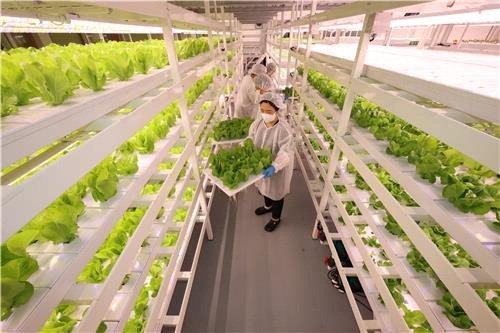SOUTH KOREA: Local Governments Across The Country are Working on a Project to Create a Smart Farm
WOO Sungduk - wsd@mk.co.kr
LEE Sanghun2 - mklsh@mk.co.kr
Kyeongho Ko - ko.kyeongho@mk.co.kr
2025-05-11
Smart farm established at the Administrative Welfare Center in Sangin-dong, Dalseo-gu, Daegu. Dalseo-gu District
Local governments across the country are working on a project to create a smart farm that realizes high-tech agriculture by utilizing idle spaces and abandoned buildings in the city center. This is because smart farms made against the backdrop of various spaces from underground sidewalks and abandoned factories to vertical farms are attracting attention as a model for revitalizing the local economy and fostering young farmers.
Smart farm refers to a farm that combines information and communication technology (ICT) with agriculture as a whole to manage the growing environment of crops and maximize production efficiency. An increasing number of cases are seeking to revitalize the local economy by actively integrating such smart farm technology into idle spaces in urban and rural areas. Gyeonggi-do Province is using underground sidewalks in the city center, which have become a crime zone due to their low frequency of use, and abandoned buildings of long-neglected factories as smart farm sites. This is part of the 'Social Innovation Smart Farm Construction Project', which is promoted in two forms: urban smart farms and residential rural smart farms. In April, agricultural corporations Palm Farm and One Acre Farm were selected as business operators.
Palm Farm recreated Baekseok underground sidewalks in Goyang City, which are less frequently used, as smart farms. Based on Palm Farm's four-season strawberry production technology throughout the year, the smart farm will be built as a complex space such as a smart farm, an experience education center, and a cafe.
A part of the site of the Wonju plant in HLman Island, Wonju-si, Gangwon-do, will also be newly developed as a smart farm complex. The Ministry of Trade, Industry and Energy recently selected the idle site of the HL Mando Wonju plant in the Munmak General Industrial Complex as the preferred site for investment in the industrial complex environment improvement fund. HL alone, which is about 17,839㎡, will invest a total of 20 billion won, including 15 billion won in government funds and 5 billion won in private capital, in idle land to build a smart farm with cultivation facilities and refrigerated warehouses by March 2045.
Buk-gu, Gwangju Metropolitan City, is also pushing for a "one stone and three trillion" project to protect the environment and increase jobs for the youth and the elderly by installing a "container smart farm" that grows eco-friendly crops using public idle land in the city center. Recently, Buk-gu created a container-type urban smart farm in the parking lot space of Buk-gu Sae Village Association. The container-type smart farm is 40㎡ of land and can stack crops up to six layers without taking up a large area, so you can get a large amount of harvest compared to the use of the land.
Some local governments create and operate smart farms in public buildings. Dalseo-gu, Daegu, has been operating a smart farm at the Sangin-dong Administrative Welfare Center building since July last year. The move is aimed at supplying vegetables at stable prices to residents at a time when vegetable price volatility has increased due to the climate crisis. The cultivation room is an eight-story, two-story structure with a real area of 372㎡, making it the largest urban smart farm in Daegu. The vegetable brand grown in the Dalseo merchant Smart Farm is "Dal Farm" and is sold in local stores. "We will present a future model of urban agriculture," said Dalseo-gu Mayor Taehoon Lee.
As the competitiveness of smart farm technology has increased, there have also been cases of successful overseas expansion. Recently, in Busan, smart farms have been installed throughout the city with the support of the Busan Economic Revitalization Support Fund (BEF), which includes nine public institutions in the region. It is simultaneously achieving the goal of expanding the spread of smart agriculture, promoting an eco-friendly distribution structure, and creating jobs by allowing socially vulnerable groups to participate in vegetable cultivation directly. Starting with the installation of the first smart farm on the Busan subway site in 2021, BEF has continued to provide support, and recently, it has even achieved exports to Poland.
[Reporter Lee Daehyun / Reporter Woo Sung-duk / Reporter Lee Sang-hun / Reporter Ko Kyung-ho]



